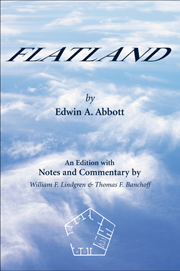Book contents
- Frontmatter
- Contents
- Acknowledgments
- Introduction
- Flatland with Notes and Commentary
- Part I This World
- Part II Other Worlds
- Epilogue by the Editor
- Continued Notes
- Appendix A Critical Reaction to Flatland
- Appendix B The Life and Work of Edwin Abbott Abbott
- Recommended Reading
- References
- Index of Defined Words
- Index
Introduction
Published online by Cambridge University Press: 05 August 2013
- Frontmatter
- Contents
- Acknowledgments
- Introduction
- Flatland with Notes and Commentary
- Part I This World
- Part II Other Worlds
- Epilogue by the Editor
- Continued Notes
- Appendix A Critical Reaction to Flatland
- Appendix B The Life and Work of Edwin Abbott Abbott
- Recommended Reading
- References
- Index of Defined Words
- Index
Summary
Edwin Abbott Abbott's Flatland is the story of a two-dimensional universe as told by one of its inhabitants, a square who is introduced to the mysteries of three-dimensional space by a sphere. Since the time of its publication in 1884, Victorian customs have become obscure, the meanings of words have changed, and historical allusions, which were obvious to a contemporary, now require explanation. The present edition is intended to enable a modern-day reader to understand and appreciate the “many dimensions” of this classic satire. The extensive annotations to the text include mathematical notes and illustrations, which enhance the usefulness of Flatland as an elementary introduction to higher-dimensional geometry; historical notes, which show connections to late-Victorian England and to classical Greece; citations from Abbott's other writings and the works of Plato and Aristotle, which serve to interpret the text; commentary on close parallels between Flatland and Plato's “parable of the cave”; notes on the language and literary style of the book, including definitions of obscure words; and an appendix, which gives a comprehensive account of Abbott's life and work.
A Romance of many dimensions.
The word “romance” in Flatland's subtitle means a prose narrative that treats imaginary characters involved in events quite different in time and place from those of ordinary life. The two-dimensional world of Flatland, inhabited by geometric figures, is manifestly different from that of ordinary life; nonetheless, a great majority of its early readers were well acquainted with the “physical space” of Flatland.
Information
- Type
- Chapter
- Information
- FlatlandAn Edition with Notes and Commentary, pp. 1 - 7Publisher: Cambridge University PressPrint publication year: 2009
